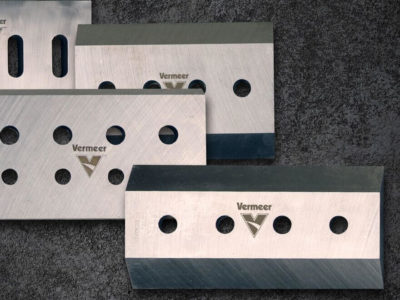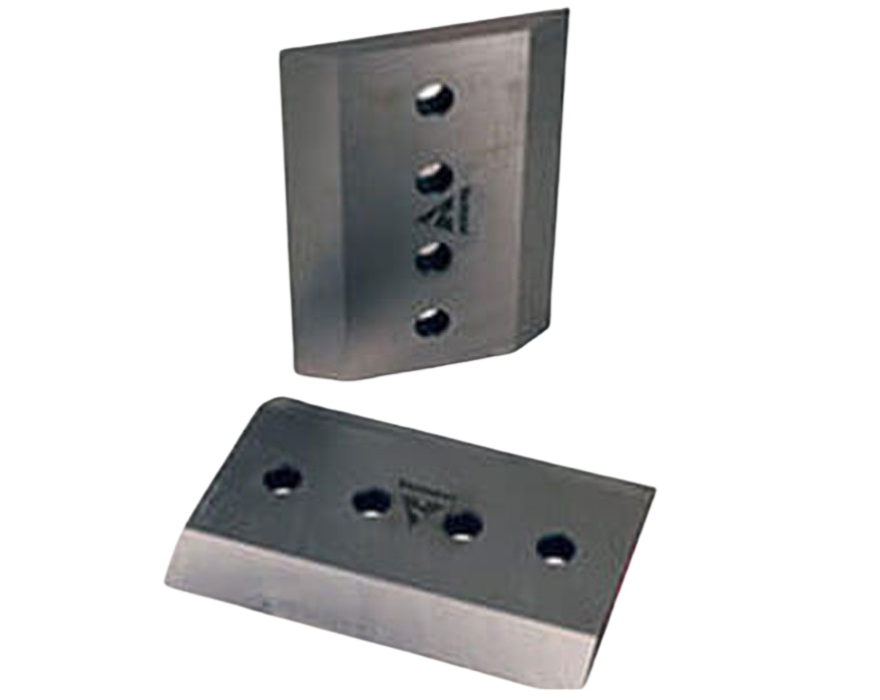What do you do with dull brush chipper knives? You have two options: get them sharpened or buy new knives. But behind that decision are some important considerations to think through, such as: Is one more cost-effective than the other, or what is the quickest option to keep your brush chipper running efficiently? We’ll cover the answers to those questions and more in the details below.
Not the sharpest knife in the chipper: How to know when knives are dull and how to maintain them
But first, it’s helpful to be able to realize the moment when your knives become dull. One way to do this is to check your knives daily.
A couple signs to look for with dull knives is the chip size. “If your chip size is consistent in the main part of the log, that means your knives are sharp,” explained Cole Chesnut, Vermeer applications specialist. “But if your brush chipper is producing stringier material, it’s an inconsistent size or your machine is getting plugged, it can mean your knives are too dull.”
Before you experience this and your knives become dull, there are some things you can do to help your knives last longer.
For example, sand, metal and debris can wear your knives down faster. So, monitoring what goes into the brush chipper and making sure that sand and metal don’t enter your chipper can help keep your knives sharper longer.
If you have dull knives, don’t let them run longer. If you continue to use them, you may risk chipping, denting or breaking those knives, because you’ve weakened that sharp edge. Also, if you let your dull knives go longer, you risk not being able to sharpen them, and you’ll be forced to buy new knives.
Another thing to note about knife maintenance has to do with the shear bar on your brush chipper. “When you sharpen knives, you have to readjust your shear bar,” said Chesnut. “Because you’re shortening the gap between the shear bar and the knife.” Refer to the machine’s operator’s manual on how to readjust your shear bar.
Sharpening vs. buying new: the pros and cons
Now that you know how to identify dull knives and how to maintain them, let’s talk about your options when it comes time to replace them.
One popular option is to get your dull knives sharpened. “If the opportunity to resharpen them exists, most people take that route,” explained Chesnut.
Some Vermeer dealers will sharpen knives, so check with your local dealer and ask them. If they don’t sharpen, they might work with a certified shop that does.
“It’s important to consider the costs of sharpening versus buying new, especially in 2022 when there are many supply issues with keeping brush chipper knives in stock,” said Chesnut. “A common and cost-effective approach is to take multiple sets of knives in at the same time to be sharpened.”
Certified shops will have a long rail that they put the dull knives on, and a grinder runs back and forth along the rail to sharpen them. The problem with this option is that it’s more time-intensive than buying new.
“Many brush chipper owners will have multiple sets of sharp knives ready to go, and then another few sets of knives that are dull and ready to be sharpened,” said Chesnut. “That way, if something happens, you aren’t stuck waiting for a shop to sharpen them.”
Pros to sharpening knives
- More cost-effective
- More viable option with current supply chain issues
Cons to sharpening knives
- More time intensive than buying new knives
- Must be a shop in your area that can sharpen them
There may come a point where you need to buy new. Maybe you haven’t been able to get to a sharpening shop and now all your knives are dull. Whatever the case, you need new knives put on as quickly as possible so you can keep chipping away.
Especially for bigger fleets that don’t have access to a hometown sharpening shop or mechanic, it can be more efficient to have their employed mechanic put new knives on their brush chipper and keep running.
“Buying new knives is definitely the quicker option, but it also costs more than sharpening,” said Chesnut. “The other danger with buying new is to not let your knives run longer than they should, so daily checks are even more important.”
Pros to purchasing replacement knives
- Quick and efficient way to replace dull knives
- Doesn’t require a certified shop
Cons to purchasing replacement knives
- Costs more than sharpening
- Can be hard to find with supply chain issues
Ultimately, the choice is yours and depends on your unique business and situation. Depending on where you’re at, you may or may not have access to a mechanic or shop that can sharpen knives.
One other pro tip when installing a new or sharpened set of knives is to discard the existing mounting bolts and use new Vermeer-approved bolts. “The reason why is because repeated reuse of the bolts will decrease their clamping capacity each time the bolts are torqued,” said Chesnut. And if the clamping capacity decreases, the knives can loosen or fail. It’s recommended to inspect your bolts for damaged threads, corrosion and distortion.
If you have any questions about brush chipper knives, sharpening or bolts, reach out to your local Vermeer dealer today.
Vermeer Corporation reserves the right to make changes in engineering, design and specifications; add improvements; or discontinue manufacturing at any time without notice or obligation. Equipment shown is for illustrative purposes only and may display optional accessories or components specific to their global region. Please contact your local Vermeer dealer for more information on machine specifications.
Vermeer and the Vermeer logo are trademarks of Vermeer Manufacturing Company in the U.S. and/or other countries. © 2022 Vermeer Corporation. All Rights Reserved.

